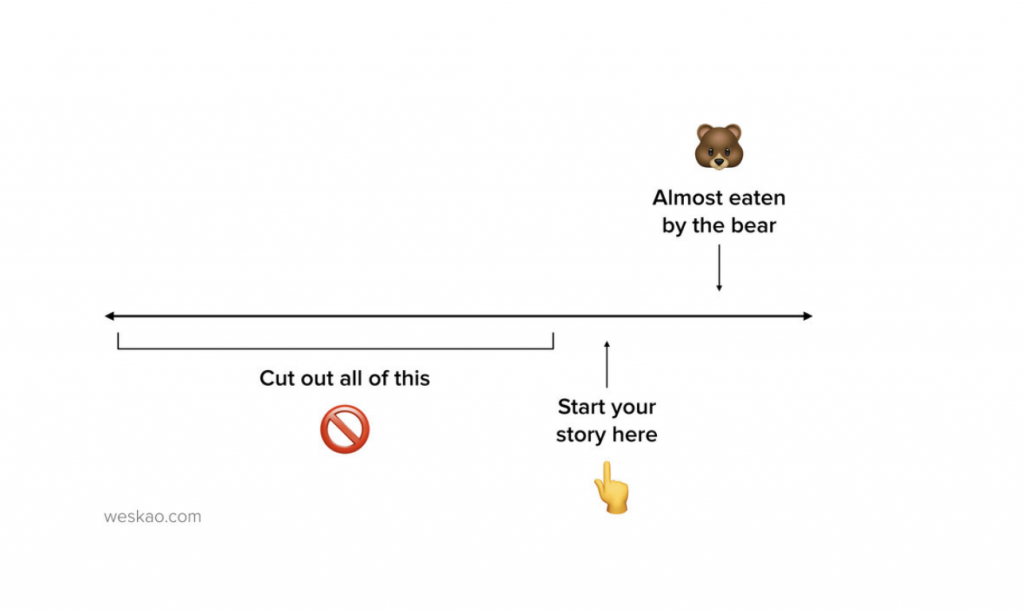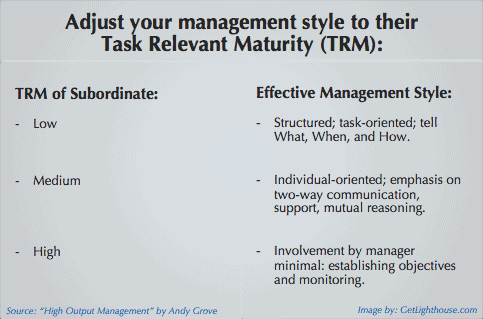How can I look good to my boss?
How do I stay on the same page as them?
What can I do to avoid unwanted surprises with my manager?
And: What are the best approaches to managing up well?
These are common questions mid-level leaders and individual contributors alike ask themselves, especially when they start working with a new team.
Unfortunately, despite these being common challenges, there's not a lot written on the subject of managing up.
At Lighthouse, our mission is to help managers and leaders be more successful at work and with their teams (and that includes managing up with your boss). So, we want to help.
That's why, in this post, we'll cover:
Table of Contents: how to start, overcoming a difficult relationship, managing up examples, and more
- How to start on the right foot managing up
- Managing up when you have a difficult relationship with your boss
- Additional tips for managing up, including key questions you can ask your boss
- And further reading to help you better manage up
We won't just offer general advice, though. To put this post together, we asked high-level leaders and experts for advice on how to better manage up specifically.
This is what they had to say.

Expert Advice for Managing Up at Work
We asked a number of leaders in the Lighthouse community for their advice on managing up. What better way to learn than from the experts? Below is some of the best advice we heard.
Special thanks to Mark C. Crowley, Beth Armknecht Miller, Wes Kao, and Oren Ellenbogen for their contributions. They come from variety of backgrounds as leaders experienced in tech, finance, and professional services around the world.
1. How to start on the right foot managing up
The best way to avoid problems with your manager is to not create them in the first place. When you can't do that, the next best thing is to fix problems when they're small.

Mark C Crowley, a leadership speaker, consultant, and author of Lead From The Heart: Transformational Leadership For The 21st Century, was a caring leader in the typically ruthless finance industry. Here's what he told his team when they started:
"It really serves no good purpose to keep people in the dark when it comes to knowing how to successfully manage up to your boss. So I'm intentionally an open book.
People who've ever worked for me know that I'm happiest when the communication I receive is direct & concise, but also anticipates the kinds of questions I'm likely to ask.
While I want my direct reports to solve problems, I also don't like surprises. So I'm very pleased when someone lets me know trouble may be brewing even when they think they have it under control. That advance notice gives me extra time to ponder solutions should I later need to be involved."
Whether by email, call, or 1 on 1, direct communication was the best way for Mark's teams to manage up to him.
While many managers may appreciate that, not everyone has the same communication style.

Learn what to prioritize when communicating
Like Mark C. Crowley, Wes Kao, the co-founder of Maven and altMBA, underlines how important it is to be concise when communicating with your boss.
For her, starting things on the right foot when managing up is all about making the most of your time together. As she put it in her viral tweetstorm:
“Most people assume backstory is necessary for high-impact communication. This is wrong and wastes everyone’s time. So how do you avoid this? Here’s my framework for higher ROI communication. You should aim for the Minimum Viable Backstory.
First, ask yourself: “What’s the minimum backstory necessary to set the context, so we can spend time on the juicy stuff?” You’d be surprised how little backstory is needed to dive in. Plus you can always add relevant information later.
For example, I can tell you about how I went camping. Three months ago, I started looking at national parks...I researched car rentals, purchased outerwear, drove 5 hours to the park, and set up our tent. Finally, 30 minutes into the story, I say:
“And on day five, Steve left beef jerky out in his tent. And the next thing we know, we’re almost getting mauled by a bear.”
The backstory crept in & buried the lede. To fix this: Start your story right before you get eaten by the bear. This applies to Q&A, pitches, team meetings, and sales conversations. Your manager wants to hear the juicy part.”
Your manager is likely incredibly busy and will appreciate you getting to the point quickly and efficiently. Talk about what matters first and sum up the gist of the issue right away.
They can always ask you more questions if you skipped too much, but they’ll appreciate you being efficient and to the point, especially on mission-critical, urgent issues.
Walk a mile in your manager's shoes

Beth Armknecht Miller, a leadership coach and Vistage Chair based in Atlanta, Georgia, has some great tips for thinking about your manager's communication and management style:
"Over the years, I have had the opportunity to coach many rising stars on their relationship with their manager, which is often the most critical thing to their success in an organization.
Here's what I tell them:
1) Know your boss's priorities and goals. When you know his/her priorities, you can tailor the information you share during meetings and conversations with them. And when you are able to assist your manager in accomplishing his/her goals, you are demonstrating you are dependable and take initiative; two highly coveted traits managers look for in their employees.
2) Anticipate the needs of your manager. The more you anticipate the needs and demonstrate your understanding of them, the more confidence and influence you will build with your manager.
3) Talk like your manager. Use the language and terms that he or she often uses and focus on the topics that are most important to him/her."
And how do you get to know their priorities, needs, and language they use? By spending time with them.
Work to get time on their calendar and communicate regularly with them to build rapport and empathy for them.
However, walking in your manager's shoes is just one part of successfully managing up. It's also important that you get what you need.
How to manage up to get the support you need

Oren Ellenbogen, VP Engineering at Israeli startup Forter, and maker & curator of SoftwareLeadWeekly, has some great advice he gives every manager that reports to him:
"The other side of "Managing Up” is to bring me closer to their day to day challenges, and share the risks and opportunities as they see them. Without this information, I cannot apply my technical intuition when judging risk, show empathy, nor protect the team when needed.
Some of the questions I like to ask are:
- What are the biggest risks you see on your team, and how do you currently mitigate them?
- Who's doing brilliant work? Are they aware of it?
- Who's struggling? What are you doing to help them?
This is a great way for them to bring relevant bottom → up context that I'm likely lacking.
We usually talk about it in-depth during our 1:1, and my homework as their manager is to think of ways to help them increase their leadership capacity."
Even if your manager doesn't ask you these questions, you can ask yourself them. Then, present the answers to your boss in your 1 on 1 for feedback.
Need help convincing your boss to start 1 on 1s with you, this post can help you make the case.

2. Managing up when you have a difficult relationship with your boss.
Unfortunately, not all managers are great. As we've covered many times on the Lighthouse blog, the statistics show the majority of us have bad bosses.
So while starting on the right foot, and communicating openly can work when you have a great boss, you need different approaches if you have a difficult one.
Because of this challenge, we also asked our experts what to do in this situation, too.

Mark C Crowley encourages you to put on your detective hat:
"Unfortunately, not all bosses are as forthcoming as how I've chosen to be, and that just means that you, as their employee, are on the hook for figuring out what behaviors please and displease them. If you want to receive good performance reviews, good raises and opportunities to grow in your career, mastering the "managing up” process is essential.
My best advice is to do some sleuthing. Ask your colleagues to individually share examples of things they've done to successfully meet your boss's needs in the past. You'll quickly see there are many common denominators – and these practices are the ones you'll want to consistently provide.
When you feel like you have solid footing with your boss, you can and should ask them directly: "What are some things I could do better or differently to help you succeed even more?”
Avoid the most common pitfalls of managing up

Meanwhile, Beth Miller gives you some tips for avoiding the pitfalls that can further damage a difficult relationship with your manager:
"Don't bring any surprises to your manager. No manager likes surprises, especially the negative ones. Keep your manager updated with current news that is significant to his or her success.
Understand your manager's strengths and weaknesses. Why is this so important? Because you want to be able to close the gap of his/her weaknesses, and leverage and learn from his/her strengths. It will also help you to anticipate how he/she will act in certain situations. For instance, if they are highly goal driven and you bring him a roadblock to accomplishing a goal, he will want to know when and how you will get around it.
Offer solutions. Managers don't want to hear all the problems you have. Rather, they want to hear the various solutions you can offer to a problem. Notice that I recommend "various solutions.” It is important that you have your own opinion on which one would be the best alternative. This demonstrates that you have carefully thought through the situation, and didn't jump to your first idea.
Whatever the challenge you are having with your boss, make sure you keep communications open. If they are a true leader they will appreciate you making the effort to reinforce and strengthen your relationship."
Ask them the right questions to be great at managing upwards

Finally, Oren Ellenbogen reminds us that how you approach managing up can make all the difference:
"I'd focus a good portion of my time around alignment with their concerns. And since often issues managing up stem from a lack of time available with your boss, I'd work to reduce the time I need to share my concerns.
To accomplish this, ask them questions such as:
- Where do you spend most of your time these days?
- What are you trying to achieve there?
- Is there a way you're trying to measure progress or success? (If so - Why did you pick these metrics?)
You won't be able to bring them closer to your challenges, but it would feel to them that your grasp of reality is similar to theirs, and you're "focused on the right things."
Most importantly, keep it in writing. It can be extremely useful in situations where they have limited time, as they can always read it and respond offline, in an asynchronous manner.
"Managing Up” here would mostly allow you the space you need in order to promote your ideas and vision as you'll be able to speak in their language."
Don’t just tell them you disagree with them, show them why
Knowing how to disagree with your manager is one of the most essential skills for managing up.
You can’t just tell your boss “no” or “you’re wrong” without a good reason. This is especially true if your relationship with your manager isn’t strong already. Disagreeing poorly will only make a bad relationship worse.
In our podcast interview with Wes Kao, she shared several great examples of what to say and not to say in such situations:
Show your thought process.
Instead of bluntly saying “I recommend this.”, try: “I recommend this because of X. My criteria/assumptions were A and B. The potential trade-off is Y, but seems manageable because Z. I vetted a range of options [insert options] and found [my recommendation] best fits our needs.”
Offer solutions and flag issues.
Don’t just bring up an issue with your manager and expect them to do all the work. Instead of saying: “This is a problem.”, try “This is a problem. I suggest doing X, because Y.”
If you aren’t sure of the best solution, bring a few starting points and talk about tradeoffs and options with them. This will help get the conversation with them going in the right direction, and their experience and knowledge can help choose the best path forward.
Turn complaints into opportunities to improve.
Try not to criticize your manager if you don’t have a suggestion for improving things. Avoid statements like “This process is terrible” or other unconstructive critiques.
What you can say instead is “This process causes Y problems, because X. I’d like to update to Z process instead, which should be cheaper/faster/easier. Do you agree if I make the change this week?”
By using these and similar sentences, you’ll be able to show you disagree with your manager but still show them your main priority is to overcome your issues. This is vital for turning around a bad relationship and making things work despite all the obstacles.
Want to hear more of Wes Kao's advice on how to get awesome at managing up? Then check out this episode of the Creating High Performing Teams podcast.
3. Additional tips for managing up at work + examples of managing up
The tips above aren't the only thing you can do to better manage up with your boss.
We've talked a lot about managing up on the Lighthouse blog, so check out these additional posts to take your efforts further:

1) Develop empathy for your manager
It's easy to forget that your boss is a person, too.
We often think of our bosses as authority figures we need to put on a good face for. However, while there are some bad apples, most bosses are trying their best to help support you.
They can't do it alone, though, and being a manager can be a very isolating job.
The first thing you can do beyond the tactics we've shared above is to develop empathy for your manager.
Empathy is defined as,"the ability to understand and share the feelings of another.” This means seeing the world through their eyes and understanding how they may be feeling.
We talked earlier about getting into their head to learn their goals and priorities, but take it a step further and learn about them as a person. Ask yourself:
- What is their workday like?
- What are they worried about?
- What is overwhelming them right now?
- What could they use help with?
If every time you talk to your manager it seems like all they're focused on is whatever problem is going on within the team or something that needs fixing, that's because they probably are in reactive management mode.
Often, being a manager means putting out fires. That's not what they want to do with their time, but it's easy for them to get overwhelmed if problems start to build up.
By taking some time to learn more about them and what their job is like, you can help them in countless ways. You can better understand which of your responsibilities is most important to them, help prevent fires from you or your team, and be one less problem stressing them out.
At the least, if you take this approach, they'll appreciate that someone on their team took the time to ask, "How can I help?” instead of being a source of problems.
Take the time to understand your manager and you'll have a better relationship with them because of it.
Further Reading: To learn more about developing empathy for your manager to improve your relationship with them, read: How to Develop More Empathy for Your Manager to Better Manage Up and Get What You Want

2) Ask (more of) the right questions for managing upwards
Asking the right questions is one of the single best ways to manage up.
That's because you can learn all kinds of things with good questions, including:
- Understand how they think and what they respond to
- Find out their priorities and motivations
- Anticipate what they want and need
- Learn their Task Relevant Maturity on your current projects
- Find out more about them personally to develop rapport & empathy
And where should you ask these? Your one on ones with them.
Your regular one on ones are a great time to ask all kinds of questions and put in the work to build your relationship with them. It's private, dedicated time where you can really dig into these topics and make progress on them
And if they're not sticking to your one on ones, or aren't doing them at all, use the tips here: How to Convince Your Boss to Start 1 on 1s with You.

Your one on ones are designed to be a safe space where you can ask questions, so your manager should expect and welcome them. Make the most of this time and learn everything you can about your manager and what they need from you.
Further reading: To make the most of your one on ones with your manager, read: 7 Essential Tips for Effective 1 on 1 Meetings with Your Manager.
What, specifically should I ask my manager?
Ask them questions like...
- Questions to understand your manager's goals and priorities:
- "What are some things I could do better or differently to help you succeed?”
- "Here are my top X priorities. Do these align with your priorities?”
- Questions to understand how your manager likes to work:
- "What have team members that frustrated you or were challenging to work with done or failed to do?”
- "What have your best team members you've enjoyed working with done when working with you that you liked?”
- Questions to anticipate what your manager wants:
- "If I need help with something, what's the best way to get your input or support on something?” (Good for hands-off managers.)
- "What's one thing I could do differently or better that would make your life easier?”
However, don't stop here. Think of your own questions you can ask, including anything that will help you work with your manager more effectively, make their life easier, get you the support and resources you need to do your best work, and get to know them in general.
The more you ask, the easier it will be to ask again in the future. They'll come to expect it and you'll become more confident and comfortable in doing so.
To find more great questions you can ask your manager, read: 18 Questions to Ask Your Manager to Improve Your Relationship and Better Manage Up.

3) Consider their Task Relevant Maturity
Do you know what your manager's Task Relevant Maturity is as it relates to your current project?

According to co-founder and former CEO of Intel, Andy Grove, in his book High Output Management, Grove describes Task Relevant Maturity as:
"How often you monitor should not be based on what you believe your subordinate can do in general, but on his experience with a specific task and his prior performance with it – his task relevant maturity.
…as the subordinate's work improves over time, you should respond with a corresponding reduction in the intensity of the monitoring.”
In the last section, we talked about several questions you can use to help you better manage up.
There's another pair of questions you can ask to help you get a better idea of their Task Relevant Maturity (TRM):
- What part of my work are you most comfortable and familiar with?
- What parts of my work are things you haven't done as much yourself?
Why does this matter?
The less familiar your manager is with a particular task you do, the more likely there are to be problems for you. They may not:
- Understand the difficulty level of requests of you.
- Appreciate work that was really hard for you or your team.
- Show enough interest nor support for that project or task.
Make sure to let them know what you need most to be successful in these kinds of tasks and anything else you need support on. Also, spend more time helping them understand this work, so they can better appreciate you and your team's efforts going forward.
This will give them a better idea of what they can do to support you despite possibly having low TRM on the task you're working on. It will also help raise their TRM over time, further improving your relationship with them.
To learn more about Task Relevant Maturity, read:
- The Most Important Aspect of Task Relevant Maturity Many Leaders Forget
- The Most Important Management Concept You're Missing: Task Relevant Maturity
Master the art of managing up
Managing up is never easy.
However, as Crowley, Miller, Kao, and Ellenbogen showed us today, if you:
- Communicate openly
- Ask the right questions, and
- Think from the perspective of your manager
...you're bound to have more success managing up.
Further reading to help you learn how to manage up at work
There's a lot more to learn on the Lighthouse blog, including more tips for managing up with your boss.
Want to know what to read next? Here are some ideas...
To learn more about managing up effectively, check out some of our other posts to help you:
- How to Develop More Empathy for Your Manager to Better Manage Up and Get What You Want
- 18 Questions to Ask Your Manager to Improve Your Relationship and Better Manage Up
- 7 Essential Tips for Effective 1 on 1 Meetings with Your Manager
- And if you're not familiar with the term, learn: The Most Important Management Concept You're Missing: Task Relevant Maturity
- Finally, when meeting with a manager, consider these questions to ask during a one on one.
Or make a bigger commitment to building a great relationship with your manager with our latest Lighthouse Lessons program, Mastering Managing Up. Get the best price by signing up now here.

How do you manage up effectively?
There's a lot you can do to manage up more effectively, including:
- Developing empathy for your manager by putting yourself in their shoes
- Asking good questions, like "What's one thing I could do differently or better that would make your life easier?”
- Considering their Task Relevant Maturity and communicating what you'll need from them to do your job effectively
Learn 4 more in depth approaches to more effectively manage up here.
Why is managing up important?
Your manager is the person who decides on your promotions, raises, performance reviews, projects assigned, and more. There are few relationships that have a greater impact on your work life.
By making the effort to be great at managing up, you're able to improve the working relationship with your manager. You'll also then enjoy work more. By improving communication and helping them do their job, you're really helping yourself, because they're the person who most influences your career and financial success.
What is "managing up"?

Managing up is the practice of working better with your manager. That includes doing things that will make their life easier, allow you to stay on the same page with them, and help you look good in their eyes.
To manage up well, you are understanding their world view and finding ways to work better together. It's a key investment to your career success, as your manager can dictate your promotions, raises, performance reviews, and projects assigned to you.
Is it part of a leader's job to manage upward?
As a leader, you need to do more than simply focus on your team. You need to set them up for success, and that begins with a good relationship with your manager.
By putting in effort to manage upward well, you'll ensure you and your team get good projects assigned to them, and the support (budget, time, mentorship, etc) you all need to thrive.
Remember: Not only does your boss largely affect your experience at work (See: Why people leave managers, not companies), but they're often the gatekeeper for your professional development and advancement in the company to higher level leadership opportunities.
So, improving your relationship with your manager will not only help your career, it will just plain make it more enjoyable to come into work each day.




